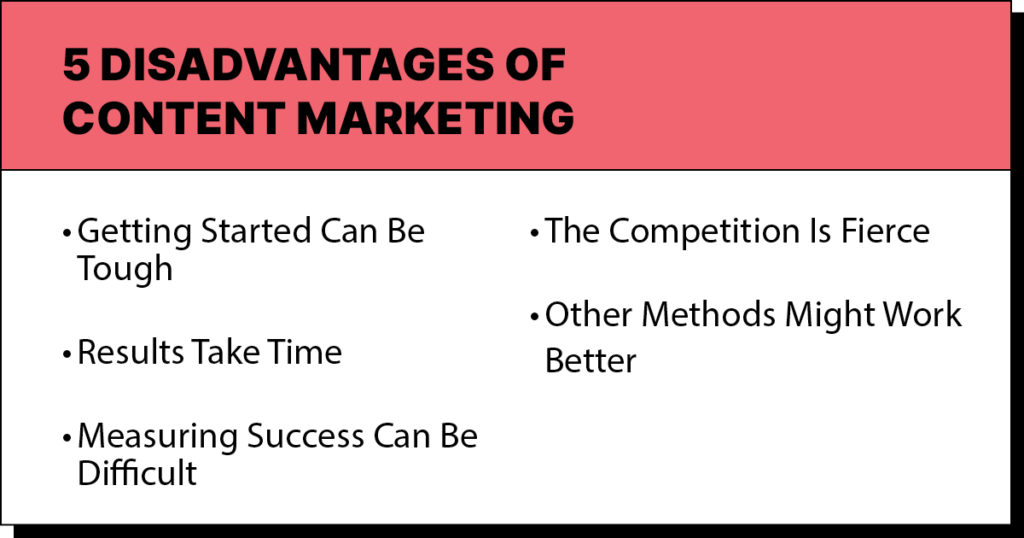We’re in the business of helping managing editors lead content marketing teams and move brands forward. We love content marketing. But every strategy has its limits, and we’d be doing you a disservice if we pretended there were no disadvantages of content marketing.
Learn more about the pros and cons of content marketing and why you might consider alternatives in your marketing campaigns.
Why Is Content Marketing So Popular?
Content marketing has become popular in recent years because it has many advantages over other ways of marketing and building brand awareness.
Content marketing allows businesses to create valuable, relevant and timely content that’s tailored to their target audiences. Done well, your brand provides valuable information while building trust and piquing interest. Content marketing helps you increase your visibility in search engines, drive traffic to your website and generate leads. It’s a powerful way to reinforce your brand identity, establish a thought leadership position and leave a lasting impression on potential customers.
Not only that, content marketing is a relatively low-cost strategy that doesn’t prevent you from pursuing other approaches including public relations, pay-per-click (PPC) advertising and inbound marketing.. All these benefits make content marketing an attractive option for businesses of all sizes.
And to no one’s surprise, brands have noticed. In 2023, 83% of businesses will increase their content budget, and 68% will spend more on search engine optimization (SEO), according to an NP Digital survey. The benefits of content marketing are real and growing, even if success isn’t as easy as hitting “publish.”
The Disadvantages of Content Marketing
Content marketing isn’t right for every business or every stage of a company’s journey, especially if you’re not ready to commit the time and resources. Here are some common disadvantages businesses encounter with content marketing.
Getting Started Takes Time and Resources
Content marketing takes time. You need to understand your goals, your brand voice, who you’re trying to reach and what they want — all before you set a content calendar and figure out how you’ll produce SEO posts, social media campaigns, gated guides and so forth.
“One of the biggest perceived disadvantages around content marketing is that of sustainability. Does my organization have the expertise and time/resources to commit to publishing content on a regular basis? And how do I prioritize digital content with other competing marketing objectives?” says Lisa Apolinski, CEO of 3 Dog Write.
Even if you’re using the latest AI in your content marketing, you can’t create content without time, effort and money. If your business doesn’t have leadership buy-in for content or wants to cut back spending, content marketing might be the first thing to go.
Results Aren’t Immediate
Instant gratification is rare in content marketing. Your early content efforts might not work because they aren’t the right quality or tone. You might be targeting your audience incorrectly — or targeting the wrong audience. Or, especially in the case of SEO content, you don’t yet have the brand authority to rank highly in searches for your top keywords.
It takes time to develop the right content strategy and to build trust and credibility with search engines and readers. And none of that guarantees this audience will immediately move down the purchasing funnel, much less become customers.
Even when you get content marketing right, it requires ongoing optimization and evaluation to ensure that your content is continually providing maximum value to the audience. Content marketing is best thought of as a long-term investment in your brand that may take weeks, months or even years to fully pay off.
Measuring Success Can Be Difficult
Brands struggle to measure the success of content marketing for many reasons, but one of the biggest is difficulty tracking the customer journey.
Prospects and customers can encounter your brand in any number of ways — advertising, a booth at a show, word of mouth. That’s hard enough to track. Content creates an additional set of variables — was it organic search, email, social media? Paid advertising? Even when you’re tracking these things, attribution is difficult.
Additionally, tracking behavior over time is complex. Prospective customers might interact with content multiple times before moving closer to a purchasing decision. For example, did that customer really make a cold outreach to sales, or did they read your blog series a few months ago and only now find time to follow up?
Not only is content marketing difficult to measure precisely, the long cycle of content makes attribution difficult. If you’re judging content marketing on a tight turnaround, you’ll probably be disappointed — even if that poor conversion rate doesn’t tell the whole story.
The Competition Is Fierce
Figuring out SEO and social media algorithms would be difficult enough if countless other brands weren’t devoting time and expertise to securing the engagement you want. Thought leadership requires a good writer and even better thoughts. Webinars sound great until you see that everyone in the world seems to be holding a webinar every week — all while people are complaining about Zoom fatigue.
And people are busy. They have more content than they could ever hope to consume in a lifetime. Your content marketing isn’t just competing for time against other content marketing; it’s competing against people’s entertainment options — games, social media, TV, YouTube and friends and family.
Content marketing is popular for a reason. And if you’re going to put in a minimum effort, you’ll lose, especially in industries where the competition for keywords or share of voice is the fiercest.
Other Methods Might Work Better
Content marketing isn’t the only way to find new business. Those other ways work pretty well, too. Depending on your industry, your budget and your business strategy, content marketing really might not be as effective or efficient as other means.

Alternatives to Content Marketing
Content marketing isn’t the only type of marketing that businesses can use to reach their target audiences. There are numerous alternatives you can use depending on your goals and resources. Here are just four of the alternatives — all of which can also be used with content marketing.
Paid Advertising
Much of today’s advertising is digital, but many brands still find value in television, print or other forms of ad spend. PPC advertising, for example, allows for detailed targeting and delivers results quickly, which can be especially important when you have a tight deadline.
If your brand isn’t capable of or prepared to create unique, high-quality content, paid advertising, might be the most cost-effective way to get your brand name out there and find customers
Event Marketing
Many brands create or repurpose content from events, getting the best of both worlds. But if your brand is strong at putting on events, especially in person, then events by themselves can be a powerful way to reach and interact with prospective and existing customers. Content marketing can be treated as optional or nice to have if you don’t have the resources to cover your event.
Public Relations
Like with events, PR and content marketing can be friends. But PR can be quite effective even if you have no content marketing strategy. When you can get ahead of the news cycle, reach media outlets and influencers, and generate positive coverage, you’re building brand reputation and helping control the narrative.
Content marketing can help your brand capitalize on the gains you make through PR, but it’s not a requirement.
Affiliate Marketing
Affiliate marketing is another possibility for businesses that want to market their products or services without creating content themselves. With this approach, you partner with other businesses or individuals who promote your products in exchange for a commission on sales generated.
This can be an effective way to reach new audiences and generate sales, especially when reputable brands or influencers are touting your goods or services. However, you have less control over the messaging than you would if you created your own content.

Should You Still Choose Content Marketing?
Content marketing remains an important part of most brand marketing strategies. We think it’ll only become more useful because of how content supports so many other parts of the business — thought leadership, paid ads, events, thought leadership, to name just a few.
But no tactic is perfect, and we all know how content marketing campaigns can fall flat if you don’t execute them correctly. By understanding the disadvantages of content marketing, you can be more deliberate in when — and how — you use content marketing to elevate your brand and engage your audience.






